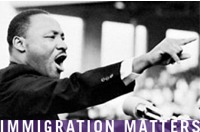
Over 25 separate conversations taking place across the state on Thursday, April 5
National campaign chairman invokes Dr. Martin Luther King, Jr.
"How do our core American values compare?"The Tennessee Immigrant and Refugee Rights Coalition has joined a national call to restore due process to immigrants:
With the STRIVE Act jumpstarting legislative action on immigration reform this spring, members and allies of the Tennessee Immigrant and Refugee Rights Coalition (TIRRC) are joining the “Night of 1,000 Conversations” on April 5, 2007 to spur Congress to address the government’s over-reactive detention and deportation practices and restore due process to the immigration system. “The Night” creates an opportunity to hold conversations in private homes and public spaces to discuss one key topic: How do our core American values compare with the actions of a government that locks people up without due process?
“Current laws unfairly deny basic due process to thousands of people in America and do nothing to solve the immigration issue. Many of us are not aware that our government wants to hold immigrants all over this country in prison without a hearing and without any plan or idea for when they will be let free,” said David Lubell of the Tennessee Immigrant and Refugee Rights Coalition (TIRRC). “Through the Night of 1,000 Conversations we’ll begin to shed some light on these unconstitutional practices and human rights violations so we can put an end to them.”
One of TIRRC’s priorities is to make sure that any reform of the immigration laws fully incorporates the American tradition of respecting and protecting due process, including fair proceedings and government accountability. The Night is held on April 5, 2007, during the Congressional recess when lawmakers will be in their districts and during the religious season for some people. It is designed to provide a path for average people, without millions of dollars in advertising money, and without advanced degrees and policy expertise, to reassert their place in the public debate on these critical issues.
TIRRC is taking part in this action as part of the Liberty & Justice for All campaign. There are over a dozen organizations helping to facilitate these conversations around the country. A full list of the leading organizations is available on the website www.rightsworkinggroup.org. Thousands of the participants will make decisions on Thursday night to take some collective action around the principles of Due Process.
Tennessee Conversations Open to the Media
* Atlanta Bread Company, 1720 West End Avenue, Nashville, TN
April 5th, 6:00pm (Central)
contact: Betsy Collum at 706-676-0343 or betsywcollum@yahoo.com
* Home of Sharmila Murthy, 105 Stokeswood Place, Nashville, TN
April 5th, 7:00pm (Central)
American Constitution Society, Nashville Chapter
contact: Sharmila Murthy at 615-525-5891 or nashville.acs@gmail.com
* Islamic Center of Nashville, 2515 12th Avenue South, Nashville, TN
April 5th, 6:30pm (Central)
contact: Rashed Fakhurrudin at 615-480-6146 or rfakhruddin@bellsouth.net
* Home of Lissa McLeod, 4627 Martin Mill Pike, Knoxville, TN
April 5th, 7:30pm (Eastern)
contact: Lissa McLeod at 865-609-2012 or orep@earthlink.net
Dr. King's Vision Shows Path to Reform
The following is a statement of Karen K. Narasaki, chair of the Rights Working Group (RWG), a national coalition of more than 200 human rights, civil rights, civil liberties and immigrant rights groups that is sponsoring the Night of 1,000 Conversations event. Narasaki is also president and executive director of the Asian American Justice Center.Thirty-nine years ago, Dr. Martin Luther King Jr. was assassinated in Memphis, but his powerful legacy, the strength of his words, his call for justice and ability to mobilize people from all backgrounds and beliefs for positive change have long outlasted his death.
Today, another important fight for civil rights is unfolding across the country, and it, too, demands a massive effort built on the call for justice. It involves protecting the basic human rights and freedoms of immigrants and their families who are striving to make the American dream their own and, in doing so, protecting the essence of our democracy for all Americans.
Amid a heated national immigration debate, Americans and non-citizens alike are facing serious erosions of fundamental freedoms. Congress will be asked to address the question of whether America lives up to its ideals of fairness in how we treat immigrants –- legal and undocumented -– in our court system.
Right now, low-level government clerks are deporting people without even giving them a hearing. No second opinion. No judge. No jury. It is a system that allows immigration officials to operate with no accountability when they make decisions that affect many thousands of people.
The U.S. government wants to imprison people indefinitely without any idea for when they will be released. Some in Congress, if they had a choice, would condemn people to prolonged detention simply because they cannot be removed to their home countries through no fault of their own.
We begin to counteract such overreaching by our government with conversations -– not unlike the many Dr. King helped to spark more than four decades ago. These conversations engaged and activated thousands of everyday citizens, changing the course of history.
As a fitting tribute to Dr. King's memory, on April 5 conversations will take place in living rooms, coffee shops, schools, community centers and places of worship. Perspectives will be shared among friends, family and neighbors of all backgrounds, professions, beliefs, racial and ethnic backgrounds nationwide. Their common bond: a desire to see positive change in the name of the American dream.
Conversations help us share our core values, and enable us to act collectively. And, as anyone who has fought for fairness knows, the impetus behind any positive political or social change almost always begins with conversation.
In fact, Dr. King himself summed it up best. “In any nonviolent campaign,” he wrote from his jail cell in Birmingham, Alabama following a peaceful protest against segregation, “there are four basic steps: collection of facts to determine whether injustices exist; negotiation; self-purification and direct action.”
We sound that resonant spirit with a chorus of voices which will honor Dr. King’s spirit and the thousands of ordinary Americans who together moved a nation by advancing a new movement for much-needed change -– to the benefit of all Americans.
Photo (top) by Richard Wanderman

No comments:
Post a Comment